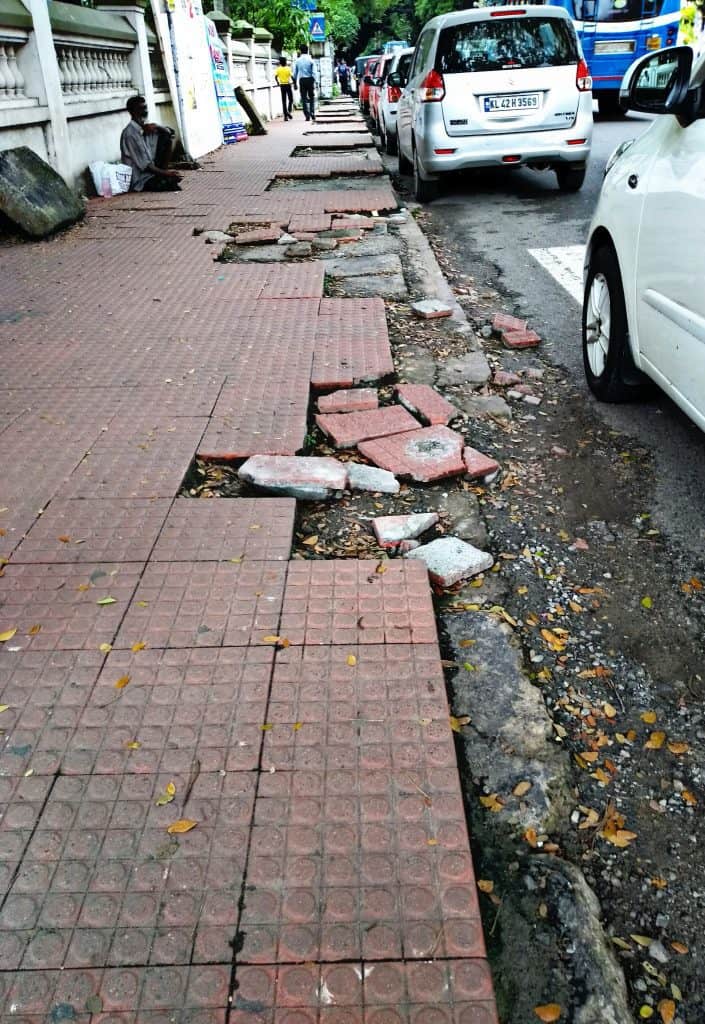“Public transport services in Kochi are not friendly for those of us who have different kinds of disabilities,” says Rahul, a resident of the city, who has reduced mobility. Rahul works for an organization in Kochi and has been using an electric wheelchair for the past year. But the wheelchair is useful for him only inside his place of work. Outside the office, he never uses public transport due to its inaccessibility and poor connectivity, and has to be dependent on personal vehicles and companions.
For Rahul, and others like him, it is not just the availability of trains and buses that matters. Bus stations, waiting areas and pavements are mostly inaccessible for people with disabilities, as most of them have no ramps for easy wheelchair access and are designed without any thought given to those with physical challenges. In a recent survey that I undertook as part of an academic project, the struggle of such people in the city came out quite starkly.
Cochin is Kerala’s most densely populated city. According to Ernakulam district profile data, nearly 2.06% of the population of Ernakulam district have disabilities. According to the Person with Disabilities Act 1995 (Equal opportunities, Protection of rights & full participation, Chapter 8), a city transport system should have proper accessibility for all. It proposes special measures to be undertaken at stations, waiting areas, pavements, road crossings to make these fully accessible for people with disabilities. Research studies have shown that increased access to transportation is a key factor in improving the quality of life of people with disabilities, lowering their isolation, and enhancing their participation in activities.

The state of access roads and footpaths also determine the ease of commute for people with physical challenges. Pic: Nelda Tomy
Not enough effort
Buses, trains and metros in Kochi do have seats marked for people with disabilities. But seldom do we see these seats being used by those for whom it was meant, because there just aren’t enough of them. Most avoid using public transport due to the risks associated with safety and accessibility.
“Once I fell down while boarding a bus,” says Diya, who is visually impaired and needs more time compared to normal people to board and alight from vehicles. “The bus started even before I could climb the steps”.
People like Diya cannot solely depend on their white cane for safe travel. Unless awareness levels and behaviour of people and transport operators undergo a major change, those like Diya will continue to face discrimination and hurdles in commute. However, perhaps the only lining of hope comes from the fact that many interviewees in my survey did feel that a change, however slow, was taking place and society was becoming more inclusive than it has historically been.
People with disabilities wish to be self-sufficient. Safe and accessible public transport would enable them to explore more opportunities and lead a better life. There are many schemes for them in different sectors including education, employment etc, but accessibility to public transport remains a weak link and creates barriers to entry.
The major public transport services in Kochi are KSRTC (Kerala State Road Transport Corporation), KMRL (Kochi Metro Rail Limited), PBOA (Private Bus Operators Association), and auto rickshaws. New facilities like low-floor buses and metro trains are wheelchair accessible and have special mechanisms to ensure safety of people with disabilities. However, the number of such low-floor buses is very low and the bus stops are not fit for safe boarding of wheelchairs.
Metro rail plies only in the city’s core areas and has least connectivity which means a rider will inevitably have to depend upon some other mode of transport to complete his trip. Neither does the metro rail offer any special fare concessions for people with disabilities.
Will things change?
Plans are underway for a new integrated transport system for the city. The KMTA (Kochi Metropolitan Transport Authority) was set up to integrate different transport departments who, in consultation with experts in transport planning, will ensure better connectivity and create a common legal and administrative structure for all forms of public transport. The plan envisages a single network, common time table, a single command and control centre and a single administrative structure. A unified front-end transport app and smart card are some of the other measures being studied.
But ‘Mobility for All’ will not be achieved until there is a change in focus from vehicle mobility to people’s mobility. There is no clarity on whether the new system is contemplating any special policies or works that will enable greater inclusion of persons with disabilities as public transport users. It should be mentioned, however, that KMRL (Kochi Metro Rail Lid) has reportedly undertaken an initiative to develop an app for booking different transport services in the city, which will be user friendly for visually impaired people. They can avail the service on their Android phones with the help of screen readers. Apart from that, specially reserved seats appears to be the only provision for them at present.
Public transport system administrators must also take into account the behaviour of bus drivers on roads and that of bus operators, safety mechanisms and general awareness in society, without which we cannot ensure that public transport is accessible for all, including those with disabilities.
[Names in the article have been changed to protect privacy]
Fine. Good effort
Good one, Nelda. Although now the act that pertains to the lives of people with disabilities is not the Persons With Disabilities Act of 1995. Its the Rights of Persons with Disabilities Act of 2016.